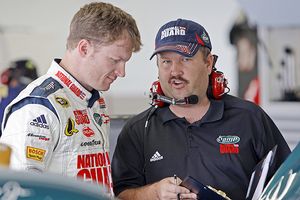By Marty Smith
Back in mid-January, on a frigid, blustery day at Dirty Mo Acres, snow bouncing weightlessly amid a sporadic drizzle, at least a month before Dale Earnhardt Jr. knew for certain how it would all go, before he had any inkling what a Hendrick hat dance felt like, he voiced to me concerns about how his team would adapt to what we media types call The Junior Factor.
It is unwritten, intangible, and there is no way to prepare for it.
But it's real and it can wear a team completely out. Ask Junior's former crew at Dale Earnhardt Inc., who sometimes chose to remove their team shirts before exiting racetracks on days Earnhardt ran badly or wrecked. Anonymity was far better than insults.
[+] Enlarge
In the Big Brother world it fosters, a sniffle can quickly become pneumonia.
But other than a pseudo run-in with teammate Jeff Gordon at Talladega that drew ridiculous focus (SOUND THE ALARM! THE FIRST CRACK IN THE ARMOR!), the No. 88 team had largely avoided any outstanding drama in 2008. They've run well, had chances to win, and won.
Then at Loudon, N.H., in the season's 27th race, during which it came to light that team owner Rick Hendrick had spent the vast majority of the day on the team's radio trying to calm Earnhardt down, that all changed.
Junior was livid that day. His car had led the early part of the race at New Hampshire Motor Speedway but faded. He cussed his cousin like he often does, seeking help in the cockpit and reassurance that it wasn't his fault. Hendrick cued the radio and reminded Earnhardt how powerful his words are -- the most powerful in the sport -- and that a lost temper often meant lost focus.
In the days following that exchange, analysts and pundits and reporters questioned what it all meant. Message boards lit up like Cheech & Chong. Suddenly, The Junior Factor was very real at HMS.
"I always knew he was a rock star, but yeah, that was an eye-opener," Hendrick said. "I didn't anticipate it would be perceived as me trying to change him or control him.
"Hendrick converses with all his drivers. He'd react similarly for Jimmie Johnson or Jeff Gordon if necessary. The difference is the aftermath: The Junior Factor.
"I want him to be Junior, but if there's something I see that he's doing that hurts his chance of winning a championship, it's my job to raise my hand and say, 'Hey, think about this.'"
Earnhardt is quite receptive to Hendrick's tutelage. "I'll tell you this, if I tell him something, he's still thinking about it four or five days later," Hendrick said. "He's a team player in every respect. On a scale of 1 to 10, this deal is a 10."
In an odd way, the Loudon radio debate with Hendrick is precisely why Earnhardt is at HMS in the first place. Junior needs affirmation, and Hendrick is one of the only people on Earth who can offer it and make Earnhardt believe it.
"The reason he came here is his relationship with me and his respect for me, and he knows I don't want to change him," Hendrick said.
It's no wonder the man wins so much.




No comments:
Post a Comment